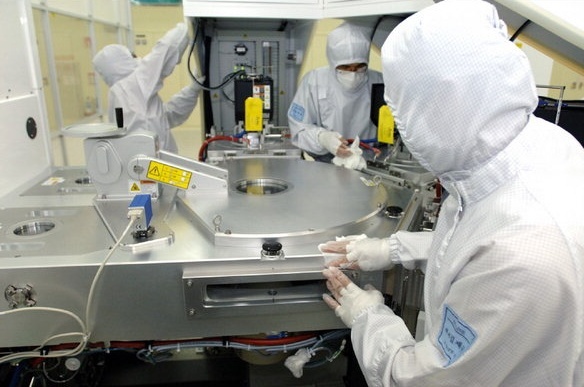The global automotive chip market is predicted to grow 22 percent this year due to the rising price and demand, according to the US semiconductor research firm.
Samsung Electronics, which is the world’s largest memory chip maker but has low presence in the automotive chip market, is also tapping deeper into the lucrative industry in response to the growing demand.
 |
Yonhap |
IC Insights said in the latest report that the automotive integrated circuit market -- microcontrollers, analog integrated circuits, DRAM, NAND flash -- is predicted to rise 22 percent this year to a new record high of $28 billion due to rising consumer demand and prices for the chips.
The market grew to double-digits at 11.5 percent in 2014 but dipped 2.5 percent the following year due to falling average selling prices across all key automotive products, which offset steady unit growth that year.
The market again rebounded with a 10.8 percent growth in 2016 driven by steadily rising ASPs along with demand for the new automotive systems, IC Insights said.
“In 2017, exceptionally strong increases in DRAM and flash memory prices are expected to help drive the total automotive chip market to an extraordinary increase of 22.4 percent,” the research firm said.
Samsung Electronics is also speeding up its automotive semiconductor business although it still has low presence in the market dominated by European and Japanese chip makers.
“Samsung and SK hynix are expected to bet on automotive chips because they are more lucrative than chips for digital devices and have high growth potential,” Lee Hang-koo, an analyst from the Korea Institute for Industrial Economics & Trade, told The Korea Herald.
Samsung is currently working with the US premium electric car maker Tesla and German firm Audi to develop chips for their self-driving and infotainment system. In April, the Korean tech giant also invested in Israeli semiconductor company Valens through its investing arm Samsung Catalyst Fund.
Another local chip maker SK Hynix is expanding its memory chip business mainly on ADAS and self-driving technologies by creating an automotive team in September. It has also been partnering with the US chip maker Nvidia to supply global automakers.
Still, experts say that the Korean firms may have a tough time penetrating the competitive automotive chip market dominated mainly by Dutch firm NXP Semiconductor, Germany’s Infineon Technologies and Japan’s Renesas Electronics.
“Automotive chip makers in Europe and Japan have fast grown by partnering with local automakers. The synergies are hard to be seen in Korea where Hyundai and Samsung view each other as rivals,” Lee added.
The nation’s largest automobile company Hyundai Motor is reluctant to work with Samsung as the tech giant repeatedly showed its willingness to jump into the automobile market by making car parts and acquiring Harman International, experts said.
By Shin Ji-hye (
shinjh@heraldcorp.com)








